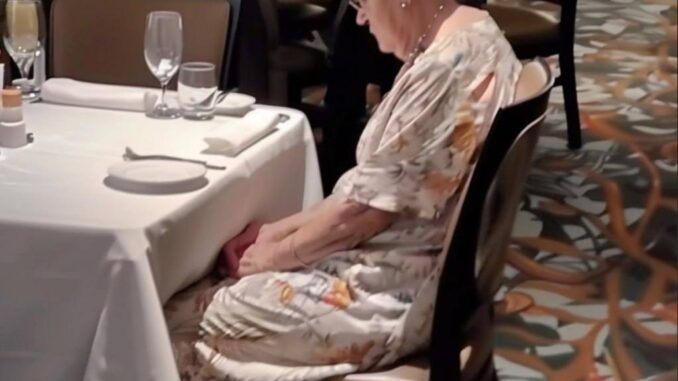
Chapter 1: A Promised Celebration
For her 85th birthday, Grandma had wished for something modest—a simple dinner among her loved ones, a chance to feel the warmth of family and reminisce about days gone by. In her quiet, dignified way, she looked forward to that evening, clutching her worn, embroidered handkerchief and a smile that belied the years of hardship she’d endured. To her, every birthday was a quiet milestone, a testament to a life defined by sacrifice, resilience, and unconditional love.
I had planned that evening meticulously. I wanted everything to be perfect: a small, intimate dinner at a place that respected her tastes—a family-owned restaurant known for its gentle ambience and classic dishes. I envisioned the soft murmur of conversation, the clink of cutlery, and the gentle laughter of a family reunited. I had hoped it would be a respite from our everyday battles, a moment when all our disparate, flawed selves could gather and feel whole, if only for a few hours.
But as the evening approached, things took an unexpected turn. My relatives, ever the opportunists when an event promised grandeur, decided that the modest dinner was too simple for our legacy. Soon, the humble venue was replaced with reservations at the fanciest steakhouse in town—a place where the waiters wore crisp uniforms and the chandeliers sparkled like fragments of a forgotten star. The invitation had suddenly become a lavish affair, a spectacle to showcase their status rather than a celebration of Grandma’s quiet dignity.
Chapter 2: The Ill-Fated Dinner
The restaurant’s opulence was blinding and contradictory to Grandma’s gentle spirit. I remember the low hum of the polished floor, the reflective surfaces that magnified every well-tailored suit, and the clinking glasses that seemed to toast to wealth rather than togetherness. Cousin Katie, always too eager to be the center of attention, posed for endless pictures, her eyes sparkling with vanity. Her brother Mark, never without a remark, sampled every expensive drink like it was his personal right. Aunt Linda, with her booming laugh and commanding tone, recommended the premium options as if a higher price tag were proof of superior character. And Uncle Joe… Uncle Joe was the mastermind behind their collective scheme, his grin a silent promise that, when the bill came, the sacrificial lamb of our group would be me.
I sat there, my heart heavy. I had anticipated a simple meal, a modest celebration in honor of the woman who had loved us all so fiercely. Instead, the table was adorned with extravagance, an overindulgence that never belonged in any moment when we were meant to honor a lifetime of modest miracles.
Then came the bill. I remember the suspense as the waiter placed the envelope in front of Aunt Linda. Her gasp echoed around the table. “Oh wow, look at that total…” she murmured, her eyes wide in disbelief. In that moment, the facade cracked, revealing all the greed and carelessness that lay beneath our family’s glittering exterior.
Katie sighed dramatically as if her financial woes—”I spent all my savings on concert tickets. Live music is important for my mental health,” she explained with theatrical sadness—were the only reason she couldn’t contribute. Mark, not to be outdone, recounted his mounting dog vet bills. And then Uncle Joe, with a cunning glint, turned to me. “You work at the bank,” he said smoothly, as if that were a badge of honor, “have no kids, live alone… What else are you spending money on?” His voice dripped with calculated indifference, and the guilt trip was ready-made: “It’s for Grandma. We might not have many more of these.”
I could feel each word like a slap. They had planned it all—the lavish meal, the indulgence, and then, when the inevitable shock came with the astronomical bill, they expected me to pay, citing my supposed lack of responsibilities. I smiled politely, concealing my inner turmoil. “Let me take care of something, and we’ll get back to this,” I said and walked away from the table, my mind swirling with disbelief and heartbreak.
Chapter 3: Abandoned in the Midst of Extravagance
When I returned, the restaurant looked strangely deserted. The table was empty, silent except for the echoes of clinking cutlery that had long since faded away. My heart began to race in anticipation and dread. And then I saw her—Grandma.
There she sat, all alone, clutching her small purse as if it were a lifeline, her face etched with worry and confusion. The luxurious backdrop of our surroundings did nothing to comfort her; if anything, it amplified her sense of isolation. “Where’d everyone go?” she asked in a trembling voice. “They said they’d be right back. Are we okay? Is everything paid for? I can cover some if I need to—I don’t have much with me, but I’ve been saving up…” Her words tumbled out in a mixture of determination and fear, and in that moment, I saw not the proud, gentle soul of my childhood, but a fragile woman overwhelmed by betrayal and loneliness.
I rushed to her, wrapping my arms around her trembling form. “Don’t worry, Grandma. Everything’s under control,” I assured her, though I knew in my heart that nothing was. We managed to finish the meal in quiet resignation, with only the restaurant staff offering the solace of polite smiles and soft murmurs, handling the rest of the bill without further incident.
That night, as we left the restaurant in silence, I held her hand tightly. The drive home was filled with unspoken sorrow—a melancholy that seeped into every word, every glance. I could see in her eyes the lingering shadow of that cold betrayal, and despite my best efforts, I knew that this was a night that would haunt us both for years to come.
Leave a Reply